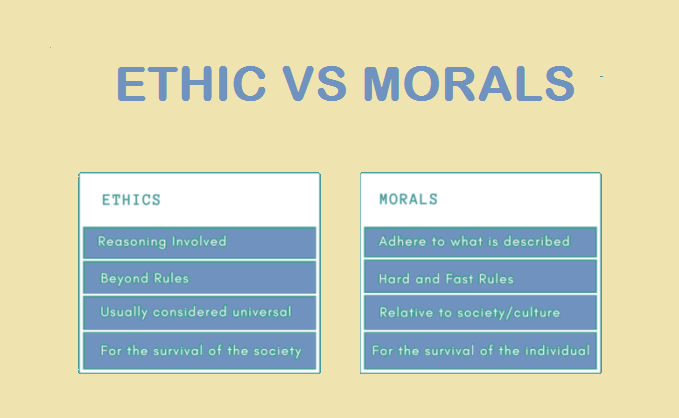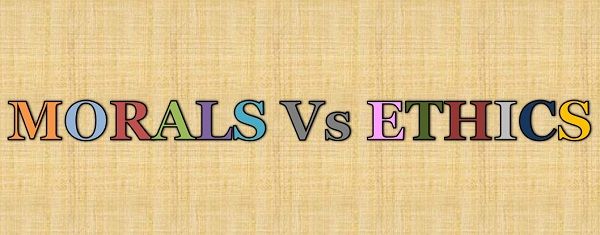Imagine this: You’re walking down the street and see a wallet lying on the sidewalk. It’s full of cash and credit cards. What do you do? Do you pick it up and try to find the owner, or do you keep it for yourself? This simple scenario touches upon a complex and often debated topic – the difference between morality and ethics. While these terms are frequently used interchangeably, understanding their nuances can provide clarity and guide our decision-making in a world full of ethical dilemmas.

Image: mavink.com
This article delves into the captivating world of morality and ethics. We’ll explore their definitions, examine their historical context, and analyze real-world applications. By understanding the fine line between these crucial concepts, you can gain valuable insights to navigate life’s decisions with increased confidence and clarity.
Morality: The Compass Within
Morality refers to an individual’s personal beliefs and values about what is right and wrong. It’s often based on deeply ingrained principles shaped by our upbringing, culture, and personal experiences. Morality acts as a personal compass, guiding our actions and defining what we consider ‘good’ or ‘bad.’
For example, consider a child being taught to share their toys with others. This lesson instills a sense of morality, emphasizing the importance of being kind and respectful. Over time, these moral frameworks evolve, becoming more complex as we encounter diverse perspectives and grapple with life’s challenges.
Ethics: Navigating Social Structures
Ethics, on the other hand, focuses on the principles and rules that govern an individual’s behavior within a specific group or profession. Ethics are often codified in written guidelines, such as professional codes of conduct or organizational policies. Unlike morality, which is personal and subjective, ethics aim to establish a framework for navigating complex social interactions.
For example, a doctor’s ethical code requires them to uphold patient confidentiality and prioritize their well-being. These ethical guidelines ensure consistency and trust within the medical profession. Similarly, a company’s ethics code might outline expectations regarding honesty, fairness, and integrity in business dealings.
The Interplay of Morality and Ethics
While morality and ethics may seem distinct, they often intertwine in our daily lives. Our personal moral beliefs influence how we interpret and apply ethical guidelines.
For example, a person who strongly believes in honesty might refuse to participate in a company tactic that they find unethical, even if it doesn’t violate any specific code of conduct. Conversely, ethical standards can shape our moral development. Exposure to ethical principles in our education or workplace can broaden our perspective and inspire us to adopt new values.

Image: www.pdfprof.com
Ethical Dilemmas: Where Right and Wrong Collide
Life is rarely straightforward, and many situations present ethical dilemmas that challenge our moral compass. Consider the case of a whistleblower who discovers illegal activities within their company. Deciding whether to expose the truth can be a complex ethical decision. Reporting the issue may be the ‘right’ thing to do, but it could have significant personal consequences for the whistleblower. Navigating such dilemmas requires thoughtful consideration of both personal morality and ethical principles.
Sources of Morality and Ethics: Where do our Values Come From?
Understanding the sources of our morality and ethics is crucial for navigating the complexities of everyday life. Here are some key influences:
- Religion: Religious teachings often provide a solid foundation for moral principles. For example, the Golden Rule, which emphasizes treating others as we would like to be treated, is a common ethical principle found in many religions.
- Culture: Our upbringing and the societal norms we are exposed to heavily influence our moral beliefs. Cultures vary greatly in their ethical values regarding issues such as marriage, family, and social behavior.
- Family: Parents, siblings, and extended family play a crucial role in shaping our moral development. Early childhood experiences with family members can influence our values and attitudes toward right and wrong.
- Education: Formal education can broaden our moral horizon by exposing us to diverse perspectives and critical thinking skills. Philosophy courses, ethics classes, and discussions about current social issues can all contribute to the development of our ethical framework.
- Personal Experience: Our own life experiences can profoundly impact our moral compass. Dealing with difficult situations, navigating personal conflicts, and encountering challenges can lead to growth, reflection, and the modification of our values.
Ethical Theories: Frameworks for Decision Making
Throughout history, philosophers and ethicists have developed various theories to guide ethical decision-making. Here are a few prominent examples:
- Utilitarianism: This theory emphasizes maximizing happiness and minimizing suffering for the greatest number of people. Decisions are evaluated based on their overall consequences. For example, a utilitarian might argue that it is ethical to sacrifice one person’s life to save the lives of many.
- Deontology: This theory emphasizes following universal rules and principles, regardless of the consequences. It suggests that certain actions are inherently right or wrong, regardless of their potential outcomes. For example, a deontologist might argue that it is always wrong to lie, even if it means saving someone’s life.
- Virtue Ethics: This theory focuses on character traits and the development of moral virtues. It emphasizes the importance of living a virtuous life, guided by qualities like honesty, courage, temperance, and justice.
- Care Ethics: This theory prioritizes relationships, empathy, and compassion. It emphasizes the importance of considering the needs and perspectives of those involved in ethical dilemmas.
Applying Moral and Ethical Principles in Our Lives: Navigating the Real World
The knowledge of morality and ethics is valuable for navigating complex situations in everyday life. Here are some practical applications:
- Making Sound Decisions: When faced with a difficult decision, considering both our individual values and ethical guidelines can help us choose a path that aligns with our principles.
- Building Strong Relationships: Understanding different moral and ethical perspectives can lead to more harmonious relationships with others, fostering empathy, respect, and understanding.
- Promoting Ethical Behavior in the Workplace: Applying ethical principles can create a more positive and productive work environment, fostering trust and integrity among colleagues.
- Engaging in Meaningful Conversations and Debates: Understanding the nuances of morality and ethics can equip us to engage in constructive discussions about important social issues.
Building an Ethical Compass: Continual Learning and Reflection
The journey of ethical development is lifelong. It involves continuous reflection, learning, and seeking to grow as moral individuals. Here are some tips for strengthening your ethical compass:
- Seek Diverse Perspectives: Engage with different viewpoints, listen to a variety of voices, and challenge your own beliefs to gain a more holistic understanding of ethical complexities.
- Engage in Critical Thinking: Don’t accept information passively. Analyze arguments, consider evidence, and question assumptions.
- Practice Ethical Decision Making: Even small decisions can shape our ethical character. Make a conscious effort to choose actions aligned with your values.
- Learn from Mistakes: Everyone makes mistakes. Accepting responsibility and learning from errors is essential for ethical growth.
Difference Between Morality And Ethics Pdf
Conclusion: Embracing the Journey of Ethical Development
The distinction between morality and ethics provides a powerful framework for navigating life’s complexities. Understanding the interplay of personal values and social guidelines empowers us to make informed decisions, build strong relationships, and contribute to a world where ethical principles guide our interactions.
By embracing a lifelong journey of learning, reflection, and ethical development, we can cultivate a moral compass that guides us toward a more just, compassionate, and fulfilling life.






